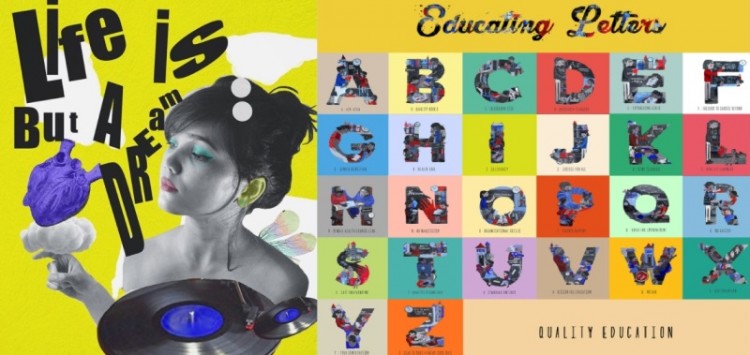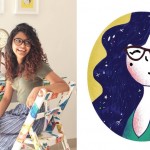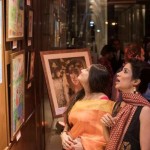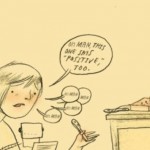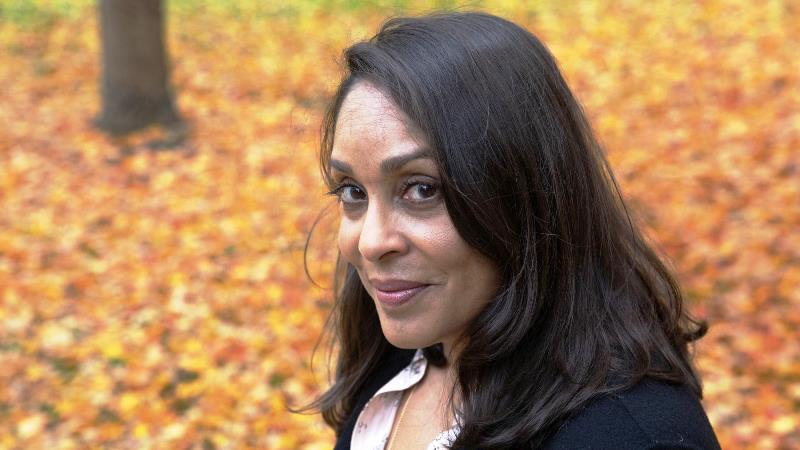Last week, I spoke with Shraddha Mandale, a 20-year-old illustrator who has recently worked on a self-initiated project called “Educating Letters” on Behance. The project seeks to highlight the importance of quality education and the unfortunate dearth of it.
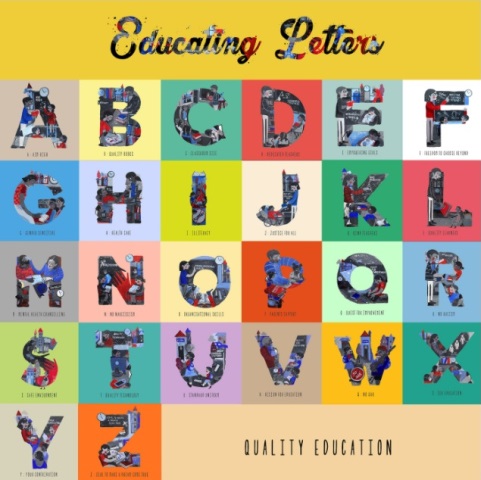
Image source: Shraddha Mandale /Behance
Suggested read: “If You Do What You Love, You’ll Never Cringe On A Monday”: #NLTTalks With Danica Da Silva Pereira
Know a little more about the project here, in her own words:
RR: “Educating letters”, what made you come up with a project as stirring as this?
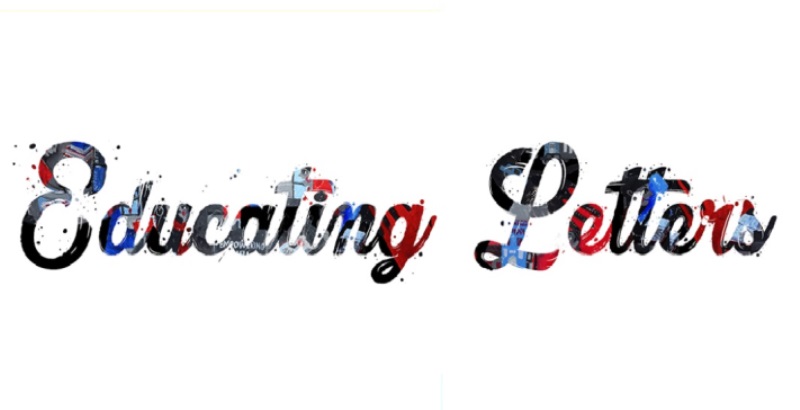
Image source: Shraddha Mandale /Behance
Shraddha: The story goes something like this… Last year, sometime around mid-October (a month prior to my 20th birthday), I was trying to think of something special to gift myself. Around the same time, there was this buzz about Coldplay coming to India for Global Citizen in November. The Indiefolio guys wanted some artists to create an artwork on global issues for Global Citizen to earn free tickets to the concert. When I learnt of this, I said to myself, “This is it! This is going to be my birthday gift”. (Laughs)
I set sail with great enthusiasm thinking about various issues I could cover, but couldn’t come up with any good ideas which I could resonate with personally. A few days later, on my way to college, I observed the kids living on open streets. Looking at them I started thinking. “Why do we only care about our children? We are fortunate enough to be having a good education, but what about them? Every child has the ability to become something great and serve the nation, but in our country, 50 million children having no access to basic education and there is such a dearth of quality education.”
I knew I wanted to cover this, and thought about the first thing we were taught as kids: ‘Alphabets’. I started my research for quality education and that’s how “EDUCATING LETTERS” was born. (Smiles)
RR: How important, do you think it is, for art to reveal what’s happening in society? Do you think it is equally important that a solution/s be furthered through art?
Shraddha: With art everything gets more lively and fun. If you are creative, then you can express yourself in various forms; be it through advertising, painting, poetry, sculpture, photography, and/or writing. For example, let’s look at advertising. The creatives are slowly trying to break free from the notion of usual stereotypical ads. They are adding more value to what they are marketing. Depicting gender-sensitive ideas through commercials, for instance, is a great step, according to me. Children’s confidence plummets during puberty, and when they are in that vulnerable phase, watching an ad where a man is always shown lifting heavy weights for a sports brand, or it is always a woman who is doing the usual household chores, indirectly, genders the children. They are introduced to the idea that women are not strong enough or that men need to always guard their masculinity. And over a period of time, these stereotypes become engrained. So, art plays a major role in steering society in a particular direction.
RR: Do you think the times we are living in currently, offers more inspiration to artists than before, or do you think artists of today are struggling for inspiration?
Shraddha: It’s a great time to be born an artist. Internet being on our side, information is available to us right at the click of a button. We’re lucky we get to connect and explore new works of people from around the world. My surroundings itself are an inspiration for me to create new art every day.
RR: Coming back to the project, let’s us talk about some of the letters and why you have interpreted them the way you have. The need for freedom to choose beyond conventional career paths; how important do you think that is, and how can it be achieved?
Shraddha: In my opinion, our future is bright if we start accepting the fact that being different isn’t a bad thing. It means you’re brave enough to be yourself. Schools should start giving more importance to extra-curricular activities than they do right now. While performing these activities, children get to choose various options and to explore themselves, and that’s very important.
People who are interested in pursuing Arts should know that the field of Arts is limitless. Today even YouTube is taught as a concept! People in these classes are expressing themselves through their unique talents and making a living out of their videos. Doesn’t that sound fun? (Smiles)
RR: You are a student of Advanced Applied Art. How difficult/easy was it for you to opt for a career that is not conformist? How important was the support of your parents? I ask this because you have mentioned the necessity of parents’ support in your project.
Shraddha: I developed an interest for drawing at the age of 4. I knew it was what I did best. That made it easy for me to opt for this unconventional career.
For a child, their parents’ support is very important; it helps boost confidence. You feel encouraged to do more, and want to make them proud. My father is an art director, and is amazing at what he does. Since I was a little kid, I have been fascinated watching him work; creating these cool designs and ads for famous brands. He has been a major inspiration. Also, I have been reading books on ads around the world, from a very small age. This has helped me understand a great deal about my career. During admissions for higher education, I decided to join Sophia Polytechnic. One night, my father came home from work, and he was carrying this huge black portfolio. He handed it to me saying, “You have an interview at your college for admissions. You just have one week to fill this portfolio up with hundreds of sketches. Go impress me, girl!” So I started waking up early and sketching profusely. When I finished my first sketch, I went to him and he was like ‘This is horrible, go do it again, and don’t come to me until it it’s perfect.” Only after a ‘million’ attempts, he said that the sketch was “fine”. (Laughs loudly) So in one week’s time, I filled this entire portfolio, and went to my college inquiring about the interview. It was then that I found out there was no interview for admissions in foundation year! It was all a lie to get me to draw. (Laughs)
RR: When we say, ‘education that is gender-sensitive’, it’s often interpreted by people as one that only promotes the interest of women, as if gender = women, like feminism = women’s rights alone. Now, nothing could be further from the truth. How would you respond to these absurd ideas?
Shraddha: I think a large amount of people have this false notion about feminism. Today, if I proudly say that ‘I’m a Feminist’, there are so many people who flinch, because they assume I am putting this label on my head that reads, ‘I hate men.’ (Chuckles)
Let us make it clear, once and for all: Feminism does not equal to women’s rights alone. Gender-sensitivity is not in women’s interest alone. Feminism talks about equality of sexes; gender-sensitivity benefits both men and women. Why is this so difficult to understand? Feminism is for everybody. We should all be feminists. All the men out there should be encouraging women for their choices and decisions and be supportive instead of labelling her. Also, women need to be supportive of men and encourage them to make the right choices. Furthermore, I think it is very important that women should not be standing on each other’s capes. They should spread some girl love by standing next to each other and complimenting each other.
Suggested read: “My Role Models Are The Children I Work With”: #NLTTalks With Dr. Priya Virmani, The Entrepreneur Behind Paint Our World
RR: Why is sex education important to ensure quality learning?
Shraddha: After looking at our country’s population, I don’t think I need to answer this one. (Laughs loudly)
RR: Do you think in a restrictive society like ours, art has a role to play in imparting sex education to our kids?
Shraddha: We as a society, need to start getting comfortable and well-informed about sex education, so that we can educate our kids better. In India, every school should make it compulsory that adolescents are counselled on this topic to create more awareness.
Again, art plays a significant role in all this. I remember, a lesbian ad came out in 2013, which was probably India’s first such ad. In it we saw that Fastrack urged the youth to get bolder, and to come out of the closet. I like the way the ad ruffles the feathers around the topic of LGBT….kudos to them!
RR: The current system of education and the way the schools operate; do you think it kills the creativity of a child? Do you think there is an alternative way of learning that can be more fun and educative, both at the same time, perhaps with art playing a more prominent role?
Shraddha: When we are kids, we’re forced to learn and judge our and others intelligence based on grades. It kills our creativity, and we also fail to understand the true importance of education. I think, it is high-time our education system brings about a change; it needs to give priority to life learning skills. It is my opinion that we need to teach our children the value of cleanliness, of eating healthy food. They should be introduced to community services, where they serve lunches to people in need, wash their dishes. They should be taught the correct way of disposing of garbage, and what are the consequences on the environment if they aren’t thrown out that way. All this will prepare them for life, I think.
When I was a kid, I had the worst self-esteem. I was so miserable; always trying to fit in. I started exploring the syllabus in a creative way, a way that would work for me. There I found my freedom, an urge to gain more knowledge. There is a dire need for a creative perspective towards learning and education.
We also need to invest money on travel, on learning about different cultures and how the real world actually works. As an artist, I feel observing the real world, helps me paint my own reality. Also, knowing the truth will make the students want to be a part of the change they want to see in the world.
RR: “N for No Narcissism”; this one got me thinking! What was the prompt behind this? The selfie culture, perhaps? 
Shraddha: (Laughs loudly) Selfies have taken narcissism to the next level! But on a serious note, narcissism in children can stem from a number of reasons; it can be genetic, it can be because of what they see around them, and most importantly, it can be caused by parents who “overvalue” their children.
Healthy narcissism is important. It is a concept that developed slowly out of the psychoanalytic tradition, and became popular in the 20th century. A healthy narcissist possesses realistic self-esteem without being cut off from a shared emotional life, which an unhealthy narcissist tends to do.
RR: You have also mentioned mental health counselling in your project. How do you think mental health can be incorporated in the overall well-being of an individual from a young age? How do you think art can help in putting a stop to mental health shaming?
Shraddha: The amount of teens experiencing depression, before they even reach adulthood, is more than 20%. Depression increases a teen’s risk for attempting suicide by 12 times.
We are in terrible need of counsellors. Every school needs to have a counsellor with whom children can interact on a weekly basis. Mental illness is nothing to be ashamed of, and art can express this in ways that children can understand.
RR: I have also read about art therapies that help patients combat depression by discovering the self. For example, talk therapy is a way of connecting emotions only and not words. Creative expression works as a major outlet for people with mental illnesses.
Moving on, you speak of creating safer space in schools; safer space in what sense – emotionally, mentally, or physically? How do you suggest it be cultivated?
Shraddha: Everything goes hand in hand. The society, parents, our surroundings, all play an important role in shaping a child’s world, but it all starts at home. Parents need to understand that their child, whether teenager or an adult, needs their emotional, mental and physical support. It has been seen that mothers start keeping a certain distance from their sons when they reach adulthood. The same is true for fathers and daughters. This shouldn’t be the case. If parents fail to understand their child, then the child tends to seek support outside their home, and who knows who they might find! Therefore, we need safer spaces for the kids to vent out. This is a message for both the parents, schools and society- The more you try to suppress kids from doing a certain thing, the more he/she will repel you. So don’t hate; educate.
If today, we start teaching our boys to understand, respect and love women, and teach our daughters to have a free spirit and to be independent, later it is quite unlikely that there will be the dreadful gender-motivated crimes we see today.
RR: What was the most challenging thing about working on this project? What was the most fun part?
Shraddha: For any creative project, constantly coming up with ideas is the challenging part. You will get ideas in the unlikeliest of places; while driving, working out, sitting on a commode! (Laughs)
To complete this project, I’d set a target for myself; I was designing at least three letters a day, and I finally managed to make it to Z!
It was tough, but I really enjoyed the whole process. I got an opportunity to study about education; its importance and value. Also, I could take a hard look at what’s happening in our society. Knowing that I am a part of the change that I hope will come in future makes me happy.
RR: Why do you think people need to check out your project on Behance?
Shraddha: Because, why not?! (Winks) It is a self-initiated project which tries to promote positive community growth. I want to spread awareness regarding the importance of quality education, and so it would be great if this project reached as many people as possible. Also, I strongly believe, art and design can be the solution to every problem we face today. 
Suggested read: “Books Promote Empathy, To Put Yourself In Someone Else’s Shoes”: #NLTTalks With Aisha Arif Esbhani
She’s told you what to do guys; go check out her project on Behance! And let us know how you enjoyed reading this interview in the comments below!
